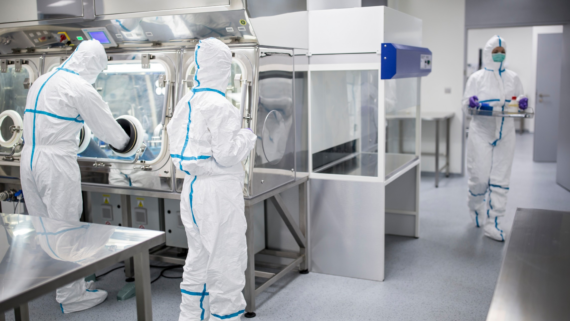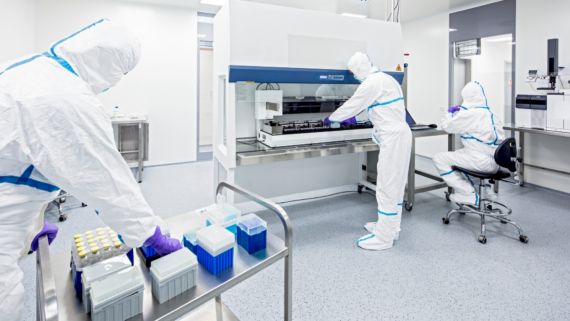Summary
Large-scale expansion of hMSCs is a crucial step towards realising their therapeutic potential. By utilising specialised MSC medium, efficient cell factories, and GMP-compliant recombinant proteins, researchers can overcome the challenge of cell quantity while maintaining high quality. This paves the way for the development of effective and scalable hMSC-based therapies.
Human mesenchymal stem cells (hMSCs) hold immense promise for regenerative medicine. Their unique ability to differentiate into various cell types and their immunomodulatory properties make them attractive candidates for treating a wide range of diseases. However, a major hurdle in their therapeutic application lies in obtaining sufficient quantities of high-quality hMSCs. This is where large-scale expansion comes in.
Here, we explore the key tools needed to effectively scale up hMSCs production:
1. Specialised Culture Medium: Fuelling hMSC Growth and Potential
hMSCs are like picky eaters. They require a specific “cocktail” of nutrients and growth factors to thrive. Specialised medium is formulated to support proliferation, providing the essential building blocks and maintain stemness of hMSCs – a key characteristic for therapeutic applications.
Choosing the right MSC medium is crucial. Deficiencies in any component can negatively impact cell growth, functionality, and ultimately, the success of downstream applications.
Traditionally, MSC media often included components derived from animal sources like fetal bovine serum (FBS). However, this presents challenges for large-scale, clinical-grade hMSCs production:
- Contamination Risk: FBS can introduce unwanted components like viruses or prions, posing a safety risk.
- Variability: The composition of FBS can vary between batches, leading to inconsistencies in cell growth and behaviour.
STEMGOLD hMSC Medium: A Powerful, Xeno-Free Solution
The current trend in hMSC research is towards xeno-free and serum-free media. This eliminates the concerns associated with animal-derived components. Advancements in research have allowed scientists to develop efficient media formulations containing nutrients, growth factors, and supplements got hMSCs culture.
STEMGOLD high-performance hMSC medium is a prime example of such a superior serum-free and xeno-free medium. Here’s why it stands out:
- Unparalleled Productivity: STEMGOLD boasts the ability to generate millions of hMSCs, significantly surpassing other leading serum-free media in terms of cell yield. This translates to a more efficient and cost-effective hMSCs production process.
- Multi-Passage Expansion: hMSCs retain their functionality and differentiation potential over multiple passages in STEMGOLD. This is crucial for large-scale production, where cells need to undergo several rounds of expansion to achieve the desired number.
- Pre-Coating Not Needed: STEMGOLD eliminates the need for pre-coating. This streamlines the hMSC expansion process, saving researchers valuable time, and simplifies the workflow, allowing them to focus on other critical aspects of their research.
- Supports Primary Isolation: STEMGOLD can be used for the initial isolation of hMSCs from tissues, eliminating the need for separate media during this critical step.
- Streamlined Clinical Translation: With cGMP versions of STEMGOLD under development, the transition from research to clinical applications becomes smoother. This ensures consistent and high-quality hMSCs for therapeutic use.
By utilising a specialised medium like STEMGOLD, researchers can unlock the full potential of hMSCs for regenerative medicine applications. Its xeno-free formulation fosters efficient, consistent, and safe large-scale hMSCs production, paving the way for future clinical advancements.
2. Cell Factories: Scaling Beyond the Flask
Traditional cell culture flasks, like T-flasks, are the workhorses of many a cell biology lab. But when it comes to large-scale hMSCs production, they simply can’t keep up. The surface area they offer is limiting, requiring researchers to use numerous flasks, which becomes cumbersome, labour-intensive, and prone to inconsistencies.
This is where cell factories come in – game-changers for adherent cell cultures like hMSCs. These are specialised biocontainers designed to provide a vastly increased surface area for cell growth while maintaining a controlled and efficient environment.
Here’s a deeper dive into why cell factories are essential for large-scale hMSCs expansion:
- Massive Scalability: Unlike flasks, cell factories come in various sizes and configurations – single-layer to a staggering 40 layers! This allows researchers to achieve significant hMSC expansion within a single, manageable unit. Imagine the space and workload reduction compared to using hundreds of flasks!
- Controlled Environment: Just like flasks, cell factories provide a sterile, closed environment for cell growth. However, they often incorporate features for better control over crucial parameters like gas exchange (oxygen and carbon dioxide) and nutrient delivery. This optimised environment ensures consistent and healthy hMSCs growth throughout the culture.
- Familiar Yet Advanced: Cell factories utilise the same basic principles of adherent cell culture as flasks. This familiarity makes them easy to integrate into existing workflows. However, they offer significant advantages in terms of scalability, control, and ultimately, the yield of high-quality hMSCs.
- Cost-Effective for Scale: While the initial cost of a cell factory might be higher than a single flask, it becomes a much more cost-effective option for large-scale production. Imagine the cost and labour involved in managing hundreds of flasks compared to a single, high-yield cell factory.
Cell factories bridge the gap between traditional flask-based culture and large-scale bioreactors. They offer a familiar, easy-to-use platform while providing the scalability and control needed for efficient and consistent hMSCs production. This makes them a powerful tool for researchers unlocking the therapeutic potential of these stem cells.
Streamlined hMSCs Production: Atlantis Bioscience’s Choice of Scalable Culture Solutions
Yes, the surface of your cell cultureware does play a role on the functional and structural growth of your cells. A compelling example of a well designed and manufactured cell factory system is the one offered by FD Cell. Their product boasts a range of configurations, with options from single-layer units to high-capacity 40-layer versions. This caters to researchers with diverse production needs. Constructed from high-clarity, USP VI-grade PS & HDPE plastic, the cell factories ensure optimal cell visibility and meet the strictest biocompatibility standards.
FD Cell’s cell factories also feature a vacuum plasma TC-treated surface. This treatment enhances cell attachment and growth, promoting a healthy and productive cell culture environment. Manufactured under cGMP conditions and sterilized using gamma irradiation, these FD Cell factories guarantee sterility and adherence to the highest quality standards. Additionally, their compatibility with automated machinery allows for streamlined and efficient large-scale hMSCs production.
It’s important to note that FD Cell offers various sterilisation methods and a wide range of customisable accessories to cater to specific research needs. This level of flexibility ensures researchers can find a cell factory configuration that perfectly fits their workflow and maximises hMSCs expansion efficiency.
3. GMP-compliant Recombinant Proteins: The Fuel for Clinical-Grade hMSCs
The specialised culture medium needed for hMSCs expansion often contains essential growth factors. These factors act as signalling molecules, instructing hMSCs to proliferate and maintain their stemness. Traditionally, some of these growth factors were sourced from animals. However, for clinical applications, a more robust and reliable solution is required.
This is where GMP-compliant recombinant proteins come into play. These proteins are artificially produced in controlled laboratory environments using genetically modified organisms. This approach offers several advantages:
- Defined Composition: Recombinant proteins are well-defined with a known structure and purity. This eliminates the variability and potential contamination risks associated with animal-derived growth factors.
- Consistent Production: Recombinant technology allows for large-scale, consistent production of growth factors. This ensures a reliable supply for hMSCs expansion, crucial for large-scale clinical trials and therapeutic applications.
- Targeted Effects: Recombinant technology can be used to engineer growth factors with specific properties. This allows researchers to tailor the effects on hMSCs, potentially enhancing their therapeutic potential.
The Importance of GMP Compliance for Clinical Application of hMSCs
For hMSCs to be used in clinical settings, they need to be produced under strict quality control guidelines. This is where Good Manufacturing Practice (GMP) comes in. GMP is a set of regulations that ensure the quality, purity, and consistency of healthcare products, including cell therapies.
When it comes to hMSC production, GMP compliance for recombinant growth factors is essential for several reasons:
- Patient Safety: GMP ensures the absence of contaminants or impurities in the growth factors, minimising the risk of adverse reactions in patients receiving hMSC therapy.
- Reproducible Outcomes: Consistent and well-defined growth factors contribute to reproducible hMSCs characteristics and functionalities. This ensures that hMSC therapies deliver consistent therapeutic effects across patients.
- Regulatory Approval: For hMSC therapies to gain regulatory approval for clinical use, they must be manufactured under GMP-compliant conditions. This includes using GMP-compliant recombinant growth factors in the culture medium.
GMP-compliant recombinant proteins are a vital component for the large-scale production of hMSCs for clinical applications. They provide a safe, consistent, and defined source of growth factors, ultimately contributing to the development of reliable and effective hMSC-based therapies.
Croyez GMP Recombinant Proteins: Safe and Reliable for Cell Therapy
Croyez Bioscience offers high-quality, GMP-compliant recombinant proteins specifically designed for cell therapy and clinical applications.
Key Advantages:
- GMP-Certified: Manufactured in a state-of-the-art facility meeting ISO13485:2016 and GMP standards, ensuring patient safety and consistent product quality.
- Animal-Free: Eliminates contamination risks with animal-free components, promoting safety and defined product formulation.
- Cell Therapy Ready: Supports both autologous and allogeneic cell therapy applications through a range of GMP proteins.
- Rigorous Quality Control: Extensive testing program guarantees identity, purity, activity, safety (endotoxin, sterility, mycoplasma), and batch-to-batch consistency.
Regulatory Compliance of Croyez Recombinant Proteins:
Croyez adheres to strict regulations for cell therapy products, including ISO 13485, USP chapters on ancillary materials and growth factors, and European Pharmacopoeia guidelines, empowering researchers and manufacturers to develop safe and effective cell-based therapies.
References
Cimino M, Gonçalves RM, Barrias CC, Martins MCL. Xeno-Free Strategies for Safe Human Mesenchymal Stem/Stromal Cell Expansion: Supplements and Coatings. Stem Cells Int. 2017;2017:6597815. doi:10.1155/2017/6597815
Hassan MNFB, Yazid MD, Yunus MHM, et al. Large-Scale Expansion of Human Mesenchymal Stem Cells. Stem Cells Int. 2020;2020:9529465. Published 2020 Jul 15. doi:10.1155/2020/9529465








